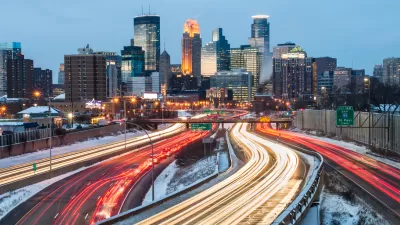A transportation sales tax can be a designated state or local sales tax where revenues are used for transportation, or a sales tax applied to fuel sales. A bill in Minnesota would grab sales taxes paid on auto parts, car rentals and leases.
"The Minnesota House late Tuesday night passed a $7 billion, 10-year transportation plan following a spirited debate that ran more than 7 hours," writes John Croman of KARE 11 news (and states in accompanying news video). "The bill takes $300 million each year in existing sales tax revenue, money now spent on general spending, and permanently dedicates it to roads."
That's the estimated amount of the sales taxes on auto parts, car rentals and automotive leases which now go to the General Fund and are used for a variety of programs including health care and education.
However, bill advocates don't appear concerned with how their bill affects the General Fund and the programs they support, as Rep. Jim Knoblach, a St. Cloud Republican, explained
"What we're doing here is taking transportation related sales taxes that have been spent on other things and putting that money toward transportation," Knoblach said.
What it comes down to is paying for transportation infrastructure without having to increase the gas tax - the dedicated fund for transportation spending, unlike Gov. Mark Dayton (DFL) who has called for a new 6.5 percent wholesale tax.
"The fact that we can solve the problem without a gas tax makes it really difficult for the governor to make a case that a gas tax is needed, and we know it doesn't have a lot of public support," House Speaker Kurt Daudt told reporters prior to the debate.
The strategy is simple: if you don't want to increase the dedicated tax rate that funds transportation spending in Minnesota, i.e., the 28.5-cents fuel excise tax rate, or add a new, dedicated funding source as Dayton has proposed, divert existing general fund revenue sources to transportation. Some would call it stealing with the imprimatur of state government.
As the "3 Minute Guide to the Minnesota State Budget" explains, there are two types of funds available:
- The state’s largest single fund is the General Fund. State collections of individual income taxes, sales taxes, corporate, and other taxes are deposited into this fund.
- Other state funds are less flexible. For example, certain revenues such as gasoline taxes or hunting license fees are deposited into funds that can only be spent for the specific purposes established in the state constitution or in state statutes. In budget terms, these are referred to as "dedicated funds."
However, the House Republicans may not be entirely off-base in their call to divert "auto-related" sales taxes to fund the Minnesota Department of Transportation. After all, the Motor Vehicle Sales Tax provided 11 percent of its 2013 budget [PDF]. Was that the "camel's nose under the tent?"
But why stop with auto rentals and auto parts? What about sales taxes on all taxable items sold in convenience stores that sell gas? After all, gas stations "make only pennies per gallon [of gas] sold," wrote Zlati Meyer of the Detroit Free Press in 2012. "Most of the profit, about 75%, comes from the markups on convenience store items such as sunglasses, hot food or medicine, according to the Associated Food and Petroleum Dealers, a trade association of independent operators."
If that diverted revenue is not enough to keep the roads in good repair, what about those huge parking lots surrounding big box stores? Certainly a portion of big box store sales taxes could be devoted to the upkeep of roads their customers use to access them?
Hat tip: AASHTO Daily Transportation Update
FULL STORY: Minn. House approves $7 billion transportation plan

Maui's Vacation Rental Debate Turns Ugly
Verbal attacks, misinformation campaigns and fistfights plague a high-stakes debate to convert thousands of vacation rentals into long-term housing.

Planetizen Federal Action Tracker
A weekly monitor of how Trump’s orders and actions are impacting planners and planning in America.

Chicago’s Ghost Rails
Just beneath the surface of the modern city lie the remnants of its expansive early 20th-century streetcar system.

Bend, Oregon Zoning Reforms Prioritize Small-Scale Housing
The city altered its zoning code to allow multi-family housing and eliminated parking mandates citywide.

Amtrak Cutting Jobs, Funding to High-Speed Rail
The agency plans to cut 10 percent of its workforce and has confirmed it will not fund new high-speed rail projects.

LA Denies Basic Services to Unhoused Residents
The city has repeatedly failed to respond to requests for trash pickup at encampment sites, and eliminated a program that provided mobile showers and toilets.
Urban Design for Planners 1: Software Tools
This six-course series explores essential urban design concepts using open source software and equips planners with the tools they need to participate fully in the urban design process.
Planning for Universal Design
Learn the tools for implementing Universal Design in planning regulations.
planning NEXT
Appalachian Highlands Housing Partners
Mpact (founded as Rail~Volution)
City of Camden Redevelopment Agency
City of Astoria
City of Portland
City of Laramie



























